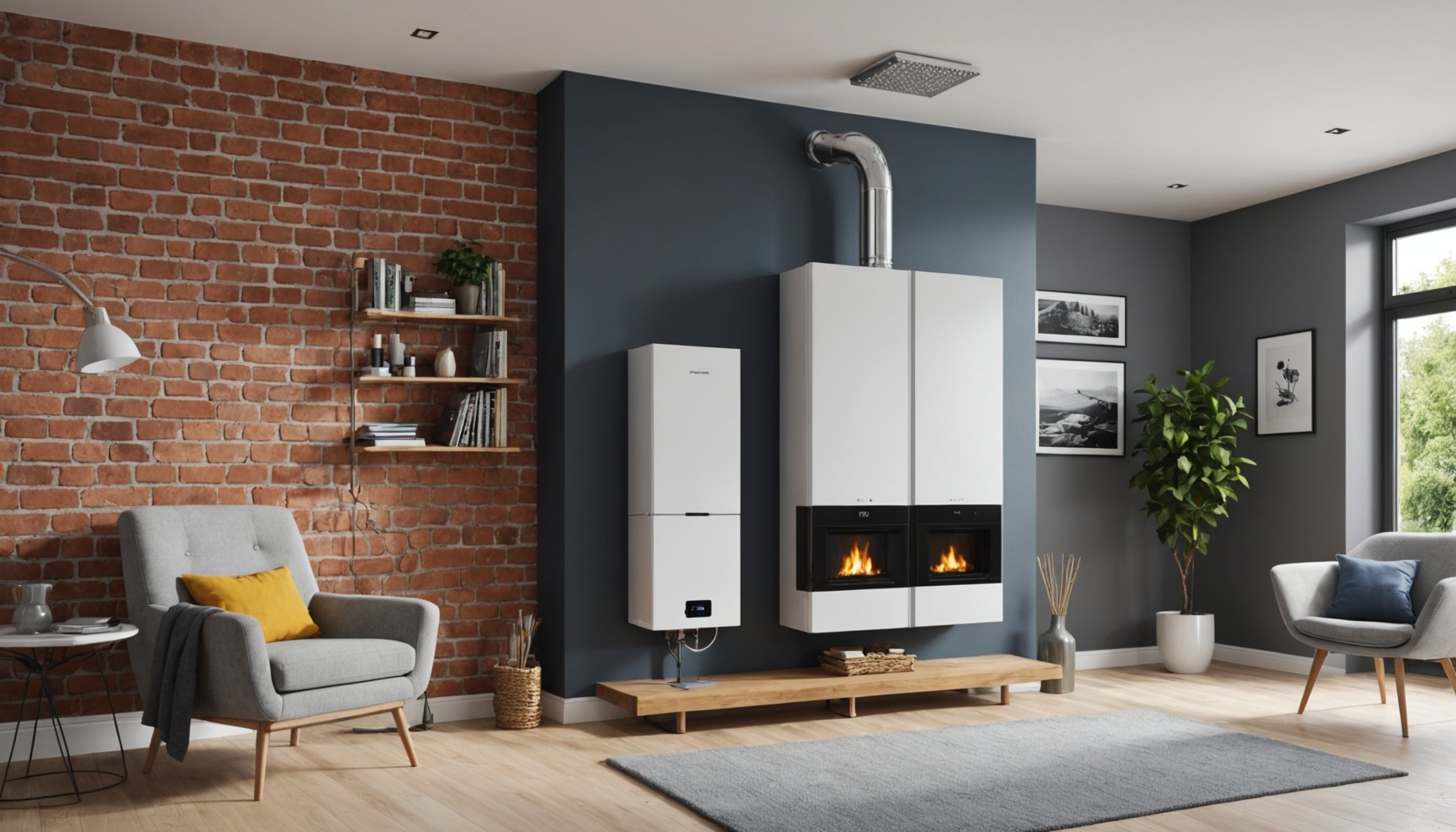Overview of Water Heating Solutions
In the UK, energy-efficient heating is becoming increasingly essential due to rising energy costs and environmental concerns. Various water heating methods are available, each offering unique benefits. Common solutions include combi boilers, heat pumps, and solar water heaters, each contributing differently to domestic energy efficiency.
Energy-efficient heating solutions are gaining traction as they promise reduced energy bills and lower environmental impact. Innovations in energy-efficient technologies are constantly evolving, allowing homeowners to choose from a range of systems designed to optimise both performance and sustainability.
Also read : Discover the Best Techniques for Effortlessly Eliminating Hard Water Stains from Bathroom Tiles in Kent
The growing trend towards renewable and energy-efficient heating methods highlights the importance of making informed choices when selecting a water heating system. With advancements in technology, UK homeowners can leverage modern solutions to ensure energy efficiency tailored to their specific household needs.
Given the diverse climate across the UK, there is no one-size-fits-all solution. Instead, homeowners are encouraged to explore various options and assess their individual requirements for water heating. Factors such as property size, existing infrastructure, and regional climate influence the suitability of different heating systems. Through careful consideration and commitment to sustainability, it’s possible to achieve both comfort and energy efficiency.
Also read : Duct cleaning montreal: improve air quality and system efficiency
Energy Efficiency Ratings
Understanding energy efficiency ratings for heating systems is vital for making informed choices. These ratings, often found on labels, provide insights into the performance and environmental impact of various heating systems. The A to G scale is most common, with ‘A’ indicating maximum efficiency. This guides consumers in choosing systems that not only suit their needs but also contribute to the environment.
In comparing energy ratings across different water heaters, combi boilers typically score high for efficiency due to their on-demand water heating capabilities, eliminating the need for separate storage tanks. This high rating often translates to reduced energy consumption. Meanwhile, solar water heaters and heat pumps shine in renewable categories, leveraging natural resources like sunlight and ambient air to heat water.
Consumers can harness these ratings to make optimal choices. Understanding the efficiency rating of a system helps predict potential energy savings. Opting for higher-rated systems often results in long-term cost benefits, reduced energy bills, and a smaller carbon footprint. Thus, energy efficiency ratings not only inform but empower users to adopt eco-friendly practices, resulting in sustainable home energy management.
Combi Boilers
Combi boilers, prevalent in the UK, are renowned for their ability to combine space heating and on-demand hot water. They eliminate the need for separate water tanks, making them ideal for homes with limited space. This functionality not only simplifies installation but also contributes to cost efficiency over time.
Benefits of Combi Boilers
Combi boilers offer several advantages. Their compact design ensures easy fitting in most homes, reducing installation complexity and potentially lowering costs. Moreover, they deliver hot water instantly, minimising heat loss typically associated with storage tanks. Such efficiency can translate to noticeable reductions in utility bills for homeowners.
Cost Efficiency and Installation
Installing a combi boiler involves initial costs, but these are generally offset by the long-term savings accrued through improved energy management. The efficiency of combi boilers in heating both water and home spaces concurrently often results in lower energy usage, translating into financial benefits over time.
User Experiences and Testimonials
Users frequently express satisfaction with combi boilers, appreciating both the immediate availability of hot water and overall energy savings. Testimonials highlight their simplicity and reliability in daily usage, further cementing their status as a preferred choice for enhanced energy management in UK homes.
Heat Pumps
Embracing heat pumps in UK homes is a step towards leveraging renewable energy, aligning with modern eco-conscious trends. These systems are celebrated for their ability to extract heat from natural sources like the air or ground and use it to heat water and living spaces efficiently.
Types of Heat Pumps
There are two primary types of heat pumps: air-source and ground-source. Air-source heat pumps harness heat from the outside air, even in colder climates, making them a popular choice for many UK households. Ground-source heat pumps, however, tap into the consistent temperature of the earth, offering remarkable efficiency but requiring more substantial installation considerations.
Analysis of Cost-Effectiveness
While installation costs for heat pumps can be considerable, they often result in significant energy savings over time. The initial investment is counterbalanced by reduced energy bills and government incentives, which aim to lower upfront costs for homeowners.
Case Studies of Heat Pump Users
Numerous case studies highlight the effective use of heat pumps, showcasing significant reductions in energy consumption and costs. UK homeowners report satisfaction with their choice, acknowledging both the reduction in energy expenses and the environmental benefits, thus cementing heat pumps as a viable alternative to traditional heating systems.
Solar Water Heaters
Solar water heating is a vital solution for enhancing renewable energy usage in UK households. These systems utilise solar panels, typically installed on rooftops, to harness sunlight for heating water. This process significantly reduces reliance on traditional energy sources, translating into energy savings and a diminished carbon footprint. Through this environmentally friendly method, homeowners can support both energy efficiency and sustainability.
Functionality and Operation
The functionality of solar water heating systems involves capturing solar energy through panels, which convert sunlight into heat. This heat is then transferred to a water storage tank, ready for domestic use. Solar water heaters require minimal maintenance and can be integrated with conventional heating systems to ensure a consistent hot water supply, even during cloudy periods.
Initial Costs vs. Long-Term Savings
While initial installation costs for solar water heaters can be substantial, long-term savings are noteworthy. Over time, the reduction in energy bills often offsets these upfront expenses. Additionally, various government incentives can aid in lowering initial costs, making solar water heating a financially viable choice.
User Feedback and Adoption Rates
User testimonials frequently highlight satisfaction due to the noticeable decrease in energy costs and eco-friendly benefits. Adoption rates are steadily increasing as more UK homeowners recognise the long-term advantages of solar water heating.
Regulatory Landscape and Incentives
Navigating the UK regulations for water heating solutions involves understanding a complex framework designed to promote both safety and energy efficiency. These regulations ensure that heating systems are not only efficient but also environmentally friendly. Compliance with these standards is crucial, as it not only impacts the functionality and lifespan of the system but also the safety of the home.
Government Incentives and Energy Grants
To encourage the adoption of energy-efficient heating systems, the UK government offers various energy grants and incentives. These financial aids are aimed at reducing the initial costs associated with upgrading to systems like heat pumps or solar water heaters. Such incentives often include subsidies, tax rebates, or low-interest loans, making the transition more accessible for homeowners.
Importance of Compliance
Meeting regulatory standards involves adhering to established environmental and safety guidelines. This compliance ensures that water heating solutions are sustainable and contribute to lower emissions. It’s essential for homeowners to stay informed about these regulations to avoid potential penalties and to optimize the benefits of government incentives. By aligning with these standards, homeowners not only enhance their energy savings but also support broader environmental goals.
Tips for Choosing the Right Heating Solution
Selecting the appropriate water heating system for your home revolves around various crucial considerations. Prioritising practical tips can help determine the most fitting solution. First, assess the property size; larger homes with multiple bathrooms may benefit from systems like combi boilers due to their ability to provide both space heating and hot water on demand. Smaller homes, however, may lean towards heat pumps for their compact nature and renewable energy benefits.
Another vital aspect is evaluating the energy efficiency of available options. Systems with higher ratings promise enhanced home efficiency, often leading to long-term savings on energy bills. Consider regional climate; in colder areas, ground-source heat pumps, which harness the earth’s stable temperature, might serve better. Conversely, solar water heating is ideal in regions with ample sunlight.
To ensure maximum efficiency and cost savings, investigate the available government incentives. These can significantly reduce initial costs, making systems like solar water heaters or heat pumps more financially accessible. Each decision should be tailored to individual household needs, promoting efficiency and sustainability.











